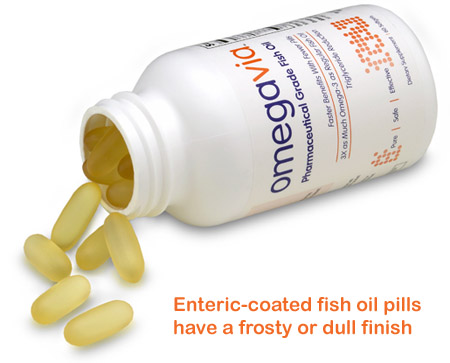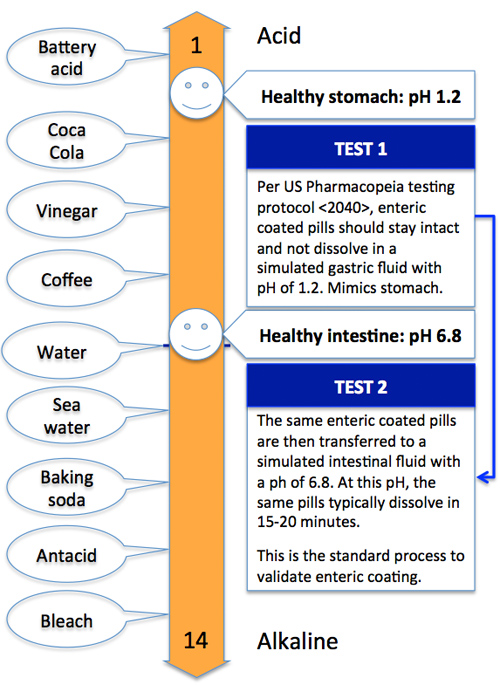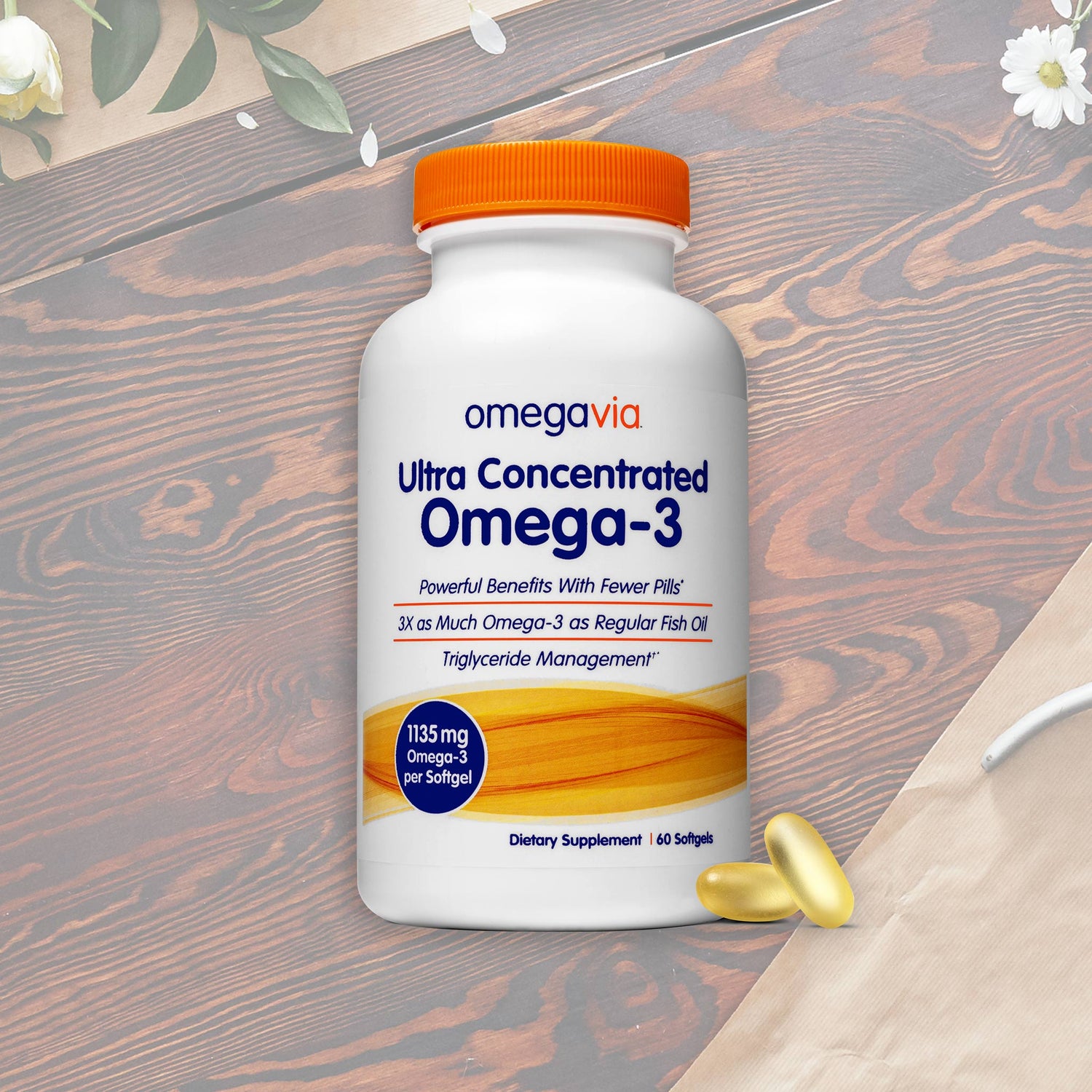- 1 in 5 adults get fishy burps
- 11% won't take it because of fishy burps
- 32 million adults will not believe a 'No Fishy Burps' label claim
 Sometimes even so-called 'Burp-free' fish oil pills cause burping. This is usually caused by low stomach acid.[/caption]
Two people could take the same fish oil supplement. But one might burp in disgust while the other smells like a rose.
Burping does not necessarily mean the oil is bad. Nor is burping harmful in anyway.
Let's assume you're a burper. What can you do to prevent it?
There are lots of tricks - freezing the pills before taking it, taking it just before falling asleep, taking it with a meal etc. None of these tricks work well.
What works better is taking an enteric coated pill.
Enteric coating works. Most of the time anyway.
20% of you will burp if you take a regular (non-enteric) fish oil. With enteric coated pills, the number is under 5%. Shouldn't it be zero? It should...but it isn't.
Sometimes even so-called 'Burp-free' fish oil pills cause burping. This is usually caused by low stomach acid.[/caption]
Two people could take the same fish oil supplement. But one might burp in disgust while the other smells like a rose.
Burping does not necessarily mean the oil is bad. Nor is burping harmful in anyway.
Let's assume you're a burper. What can you do to prevent it?
There are lots of tricks - freezing the pills before taking it, taking it just before falling asleep, taking it with a meal etc. None of these tricks work well.
What works better is taking an enteric coated pill.
Enteric coating works. Most of the time anyway.
20% of you will burp if you take a regular (non-enteric) fish oil. With enteric coated pills, the number is under 5%. Shouldn't it be zero? It should...but it isn't.
How Enteric Coating Works (and why it sometimes fails)
Enteric coating is sprayed onto the outside of the pill. The coating will stay intact and prevent the pill from dissolving in the acidic environment of your stomach. Once the pill has moved past the stomach and into the small intestine, the surrounding environment is no longer acidic. It is neutral. In non-acidic environments, the enteric coating dissolves and the fish oil is released into the intestine for absorption. Since the pill dissolves in the intestines and not the stomach, you will not experience fishy burps. Well, you shouldn't. The reason that enteric coating works is due to the highly acidic nature of the stomach.There are two reasons why enteric coating of fish oil supplements fail:
- The coating is chipped or cracked
- Your stomach is not as acidic as it should be
- Hydrochloric acid is near 0
- Battery acid is near 1
- Coca Cola is about 2
- Vinegar and Lemon juice is about 3
- Wine is about 4
- Coffee is about 5
- Rain water is about 6
- Pure water has a pH of 7
- Seawater is about 8
- Baking soda is about 9
- Antacids are about 10
- Milk of magnesia is about 11
- Bleach and oven cleaners are about 13
- Sodium Hydroxide (household lye) is about 14
 The pH scale. Enteric coated fish oil pills are tested twice. The first test shows whether pills holds up to stomach acid and the second test shows that it dissolves quickly at neutral pH of the intestine.[/caption]
Here's the surprise - many people don't produce enough stomach acid.
There are several reasons for this:
The pH scale. Enteric coated fish oil pills are tested twice. The first test shows whether pills holds up to stomach acid and the second test shows that it dissolves quickly at neutral pH of the intestine.[/caption]
Here's the surprise - many people don't produce enough stomach acid.
There are several reasons for this:
- age
- stress
- poor thyroid function
- nutritional imbalances
- H. pylori infection due to gut microbiota imbalance
- Pernicious anemia
- long-term use of heartburn medications, etc.
How does low stomach acid affect enteric coated fish oil pills?
Enteric coated fish oil pills will work perfectly well at pH of 1, 2 or 3. But at pH of 5 or 6, it won't work. pH of 6 is getting close to being neutral and the enteric coating starts to dissolve. Natural enteric coating made from algae (like the kind on OmegaVia) has a pH trigger of 3.5. In other words, the pill starts to dissolve when the surrounding acidity rises to 3.5. Synthetic enteric coatings made from methacrylic acid copolymers have a pH trigger of around 5.5, which will work better for people with hypochlorhydria. If you have a low-acid stomach, the enteric coated pill 'thinks' it's in the intestine and promptly dissolves. If you burp up fish oil after taking an enteric coated product, your stomach acid production is compromised. The burping window is 2-3 hours. This is a very simple test for hypochlorhydria. Doctors should be using enteric coated fish oil pills to test their patients' stomach acid production. It is a simple, cheap and safe test. The only downside is that if your stomach isn't acidic enough, you may burp for about 3 hours. People with this condition may not know that they have low stomach acid. We know. We hear from customers who have this issue. Our customer service folks are not doctors. They are neither qualified nor authorized to diagnose you with hypochlorhydria. But we keep detailed notes of angry calls from burpers. We've noticed trends and have learned a thing or two about stomach acid.Temporary cures
If you take OmegaVia and experienced burping, you may want to do a small, self-experiment: take your OmegaVia with something acidic. Your choices are:- Orange juice (pH of 3.5) but you will have to drink 6 to 8 oz every hour for 3 hours. If you burp when you take the pills with water and don't burp with orange juice, you may have stomach acid issues. Coca-Cola will work better. But both beverages are harmful if consumed regularly.
- Powdered ascorbic acid. This is Vitamin C. Mix half a teaspoon into 8 oz of water and sip a few ounces every hour for three hours. Too much Vit C can cause stomach distress.
- Apple cider vinegar. Same process as Ascorbic acid, but skip this if you're sensitive to yeast.
- Betaine hydrochloride - this may require assistance from a doctor or a professional. Take 1 Betaine pill a few minutes before your enteric coated fish oil pill. Take one every hour for three hours. This may be your best bet in the long run.
The Elephant in the Stomach
Removing the inconvenience and nuisance of a fishy burp is minor compared to addressing the key issue: decreased stomach acid. I strongly suggest you go to a functional medicine doctor to get to the root of this problem because fishy burps are the least of your problems. There are several health issues associated with low stomach acidity. Find the root cause and fix it. Low stomach acid can cause several nutrient deficiencies. Another issue is that a healthy stomach is a very hostile place for most bacteria. With a low-acid stomach, bacteria from the mouth, intestines and elsewhere can easily colonize the stomach. A low-acid stomach is also unable to reliably kill pathogens like Salmonella. If you go to a general practitioner, he or she may simply send you home with an antacid, which fixes nothing. Go to a functional medicine MD. Once the problem is truly addressed, you will not only not burp up 'burp-free' fish oil pills, but you'll feel a lot better a lot healthier.Your turn...
- Do you get fishy burps without enteric coating?
- More importantly, do you get fishy burps even with enteric coating?
*These statements have not been evaluated by the Food and Drug Administration. This product is not intended to diagnose, treat, cure, or prevent any disease.



